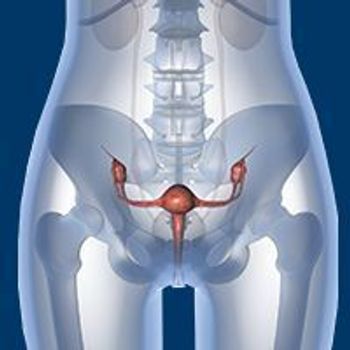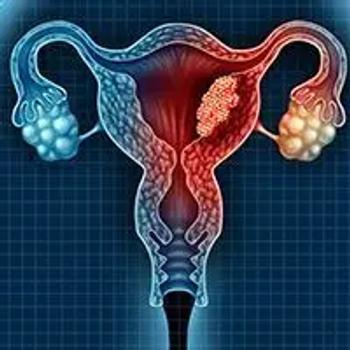
Cortney Eakin, MD, discusses racial disparities and histology trends in uterine cancer.

Your AI-Trained Oncology Knowledge Connection!


Cortney Eakin, MD, discusses racial disparities and histology trends in uterine cancer.

Casey M. Cosgrove, MD, discusses utilizing biomarker-informed treatments in endometrial cancer.

Cortney Eakin, MD, discusses alarming trends in uterine cancer histologies in Black women and some of the potential underlying risk factors at play.

Sarah Lee, MD, MBA, discusses the association of microsatellite instability–high, mismatch repair deficiency, and tumor mutational burden–high features in endometrial cancer.

Amer Karam, MD, discusses determining whether to use debulking surgery after recurrence in ovarian cancer.

Jubilee Brown, MD, discusses recent developments and upcoming trials exploring minimally invasive surgery in ovarian cancer.

Yovanni Casablanca, MD, discusses the integration of pembrolizumab (Keytruda) into the paradigm of recurrent or metastatic cervical cancer.

Yovanni Casablanca, MD, discusses the incorporation of new treatments into the cervical cancer paradigm and provided insight into the necessity of inclusive research with novel therapies.

Bradley R. Corr, MD, discusses practice-changing developments and active clinical trials that are being done in endometrial cancer.

Casey M. Cosgrove, MD, discussed the current state of biomarkers in the realm of endometrial cancer and how they may be optimally leveraged for prognostic and predictive purposes.

Bradley R. Corr, MD, discusses the utilization of molecular profiling in endometrial cancer.

Chemotherapy in combination with immunotherapy holds promise in the treatment paradigm for patients with ovarian cancer, Floor Backes, MD, said at the 2020 SGO Winter Meeting.

Robert L. Coleman, MD, FACOG, FACS, discusses the role of rucaparib as a treatment option for patients with ovarian cancer, how this agent compares with other PARP inhibitors in this space, and where research is headed for these agents.

Floor J. Backes, MD, discusses the role of PARP inhibitors as treatment of patients with ovarian cancer and her experience with these agents, such as rucaparib.

Angeles Alvarez Secord, MD, discusses a presentation from the 2020 SGO Winter Meeting that focused on assistance with the financial burden associated with PARP inhibitors in patients with ovarian cancer.

Three pivotal clinical trials evaluating PARP inhibitors have significantly impacted the treatment of patients with newly diagnosed ovarian cancer.

Ian Hagemann, MD, PhD, discusses the main take home from his presentation at the 2020 SGO Winter Meeting.

Julia Fehniger, MD, shares her thoughts on the development of PARP inhibitors in ovarian cancer and expansion into other tumor types.

With few chemotherapy options available for patients with cervical cancer, R. Wendel Naumann, MD, said that immunotherapy represents an attractive treatment option in the landscape.

Angeles Alvarez Secord, MD, gynecologic oncologist, Duke Cancer Center, discusses the role of PARP inhibitors in ovarian cancer based on their current indications in the treatment landscape.

Carrie L. Langstraat, MD, gynecologic oncologist, Mayo Clinic, discusses the role of sentinel lymph nodes in patients with endometrial cancers.

Floor J. Backes, MD, discusses the latest advancements made in the treatment of patients with ovarian cancer and the ongoing research efforts that are being made with novel combinations.

Tumors from a significant percentage of patients with endometrial cancer at NYU Langone Health’s Perlmutter Cancer Center were found to have BRCA1/2 somatic mutations.

In ovarian cancer, disease that returns within 6 months of treatment following platinum-based therapy is defined as platinum-sensitive.

Researchers and practicing physicians have done as much as possible with chemotherapy as a systemic treatment for endometrial cancers, and other modalities—alone and in combination—are likely to become standard of care in the coming years, Shannon N. Westin, MD, MPH, said during a presentation at the 2020 SGO Winter Meeting.

Maintenance treatment with PARP inhibitors should be the standard of care in the frontline setting for patients with ovarian cancer, Kathleen M. Moore, MD, said during a presentation at the 2020 Society of Gynecologic Oncology Winter Meeting.

Successful application of immunotherapy in endometrial cancer means identifying the patients with inflamed tumors who will respond to treatment and those who will not, and finding ways to treat noninflamed tumors with immunotherapy agents.

Robert Coleman, MD, highlights recent advances made in gynecologic cancers and provide insight into ongoing research to move the needle forward.

Charles A. Leath III, MD, gyn oncologist at the University of Alabama at Birmingham, discusses the glaring unmet need in cervical cancer.

Robert L. Coleman, MD, FACOG, FACS, professor, Department of Gynecologic Oncology and Reproductive Medicine, The University of Texas MD Anderson Cancer Center, discusses advances made in the treatment of ovarian cancer.